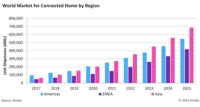The global video surveillance market revenues are set to reach $24 billion by the end of 2021, according to Omdia’s latest Video Surveillance and Analytics Intelligence Database.
This marks a quick recovery for the video surveillance market as demand that was suppressed in 2020 will return and revenues will be bolstered by projects that were postponed in 2020 due to COVID now getting the greenlight in 2021. Omdia forecasts that total video surveillance market revenues will grow to $31.9 billion by 2025 with a total CAGR of 7.1 percent between 2020-2025.
According to Omdia, thermal body temperature solutions serve as a growth driver and inhibitor. The size of thermal body temperature solutions market has rapidly grown to $1.3 billion globally in 2020. Driven by COVID-19 precautions, this technology has been adopted by several regions, specifically China, East Asia, India and the Middle East. However, without the growth in thermal body temperature solutions, the global video surveillance equipment market declined 3.8 percent globally in 2020
Despite being a driving growth factor in 2020, Omdia forecasts the thermal body temperature solutions market will decline rapidly in 2021 to just $137 million, an 89.8 percent decline, ultimately limiting the overall video market surveillance market growth.
Omdia also found that geopolitics, supply chain constraints and AI developments increase average selling prices. Omdia expects average selling prices of video surveillance equipment to increase in the short term as U.S.-China geopolitical tension and supply chain constraints from the COVID-19 pandemic increases pressure of vendor margins.
In recent years U.S.-China geopolitical tensions within the video surveillance industry have escalated. The initial NDAA and blacklisting of Hikvision, Dahua and Huawei within the U.S. is being augmented by new FCC regulations.
“The semiconductor shortfall driven by geopolitics and COVID impact has affect all industries, and video surveillance is no expectation,” said Oliver Philippou, research manager, physical security. “This disparity between supply and demand is expected to last until mid-2022.”
Longer term, Omdia expects that there will be a greater adoption of the network camera products using AI deep learning acceleration and inference at the endpoint. This will result in higher average prices of network cameras.
The Chinese video surveillance market is estimated to have grown 6.4 percent in 2020 compared to the global average of 2.2 percent. This growth is mainly attributed to thermal body temperature solutions. The market excluding such solution is estimated to have decline by 0.8 percent. As such, China now accounts for 50 percent of the global market revenues. However, a combination of COVID-19 and the completion of Xue Liang program has resulted in declining government investment in video surveillance in China. Even so, the government investment will continue grow, all be it at a slower rate.
“One of the major factor that drove the China’s market growth in the past few years was government investment,” said Tommy Zhu, senior analyst, physical security. “Although the year of 2020 marks the completion of Xue Liang program, the government will continue to enhance the construction of Safe China during its 14th five-year plan. In addition, as China is rolling out its trillions of dollars investment in new infrastructure construction, the demand for video surveillance equipment is expected to continue to grow. Besides, China’s ambitious to accelerate the transformation to a digital economy will boost the investment in both public and private sectors.”
To read the full report, visit Omdia’s website.




